The
PhotoDrama of Creation
Section 5
The
Fate of the Amalekites
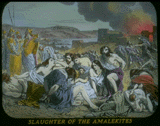
King
Saul, never seemed to enter into the spirit of the Lord's
commands. He always manifested self- will; even when given
special directions through the Prophet Samuel, he deviated
and was reproved.
One
failure of King Saul was when called upon to slaughter
the Amalekites and drive them out, he did not fully obey.
He spared the king, etc. Many have thought it strange
that God would give such commands as this and others similar.
The most satisfactory explanation is that the whole world
is under the death sentence, and that it makes very little
difference whether they die by pestilence, famine, or
sword. The wickedness of the Amalekites is declared to
have come to its full, just as with the Sodomites. The
decree was extermination.
Had
the slaughtered people, as we once thought, gone to eternal
torment, the matter would have been most horrible. However,
the entire aspect is changed when we recognize that God's
provision for the Amalekites as for the Sodomites is a
resurrection, secured by Christ's death. As we have already
seen, the Sodomites are to have the privilege of returning
to "their former estate," and to human perfection.
So all who do not receive a knowledge of God in the present
life are to have that opportunity during Messiah's Reign.
Another
illustration along this line is that of Sennacherib's
army, which was smitten by the angel of the Lord in one
night, probably by a sand-storm.--2 Kings 19:35,36.
Gross
misconceptions of God's character and the Bible teachings
accumulated during the Dark Ages, when the Bible was not
in existence so far as the masses were concerned. Bibles
were very expensive and possessed only by the few; besides,
very few could read. They did not know that the worship
of an eternal torment deity is the worship of Moloch,
which God specially condemned. The dawning light of a
New Age shows us God's character of love and illuminates
the Bible, making its teachings most reasonable.--Proverbs
4:18.
The
Witch of Endor
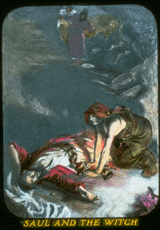
We
have already noted that the fallen angels at the time
of the Deluge were barred from further materialization.
Since then they have sought otherwise to influence humanity.
Few would communicate with them if they knew their real
character; hence they represent themselves as being our
dead friends and relatives. As such they attempt to communicate
with the living through "mediums," who are deceived,
else they would not serve as "mediums" for demons.--Isaiah
8:19;Deuteronomy 18:9-12.
In
olden times these mediums were called witches, wizards,
necromancers. They had "familiar spirits," or
were familiar with the spirits who were disobedient in
the days of Noah.
God
had forewarned Israel against these evil spirits and their
mediums. He said that no such mediums should be permitted
to live in the land of Israel. They might operate amongst
nations not under Divine care, but God's representative,
Saul, was commanded to put to death all such.
When
King Saul got out of fellowship with God, who refused
further communications, he turned for advice to a witch
at Endor, and asked her to awaken Samuel the Prophet,
who meantime had died. The evil spirits impersonated Samuel
easily enough, and the witch gave the King messages in
his name, whereas Samuel was dead and could not give or
receive messages. King Saul saw nothing; he merely received
an answer from the witch, who said she saw and heard Samuel.
The
evil spirits have some way of knowing much respecting
the future. But anybody under the circumstances might
have known the fate to expect for Saul and his army. The
King himself knew what to expect. It was this that troubled
him and led him to seek the witch, contrary to the Divine
command. It is not for a moment supposable that God and
Samuel, having refused to communicate with the King, would
change and permit a witch, condemned by the Divine Law,
to overrule the matter.--1 Chronicles 10:13,14.
The
Prophet's Reproof

There
is one thing about the Bible distinctly different from
every other book--its honesty. Although David was king
and his own family succeeded him for generations, nothing
prevented the full details of his misdeeds in respect
to Uriah and his wife. The wrong is as fully exposed as
though the King had been a menial of the lowest class.
The
Prophet of the Lord was sent directly to the King by Divine
command. He made a parable showing the injustice, and
asked what would be the just decision. King David was
angry, and asked the name of the unjust man that he might
be punished. God's Prophet fearlessly declared, "Thou
art the man!" Humbly, the King confessed his sin
to the Lord. He had already seen his horrible mistake,
but its portrayal intensified the wrong. He wept and prayed
before the Lord in sackcloth and ashes for forgiveness.
In
this respect David was a man after God's own heart. Every
time he was overtaken in a fault and snared by his own
weakness, he confessed, reformed and sought forgiveness.
God
accepted King David's penitence and restored him to His
favor; but this did not prevent his suffering punishment
for his wrong course. "Whom the Lord loveth He chasteneth."--
Job 5:17; Proverbs 3:11,12; Hebrews 12:5,6.
The
honesty of the Bible is exemplified in both the Old Testament
and the New. We are told of Abraham's mistakes-- "the
friend of God." We are also told the faults of the
Apostles. The noble St. Peter was so overcome with fear
that he denied his Master three times with oaths. We are
told of St. Peter's dissembling before Jews and Gentiles.
We are told that St. Paul, the Apostle that took the place
of Judas, was once the cruel Saul of Tarsus, who authorized
the stoning of St. Stephen, and was very injurious to
the early Church. Of St. Peter and St. John we read: "They
were ignorant and unlearned men." No other book in
the world manifests so great honesty or deserves the same
confidence as the Bible.
Solomon
in All His Glory
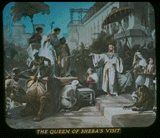
As
King David, who was after God's own heart, loyal to Him,
represented The Christ in earthly trials, afflictions
and victories, so King Solomon typified the Church glorified.
Whereas King David's reign was full of wars, King Solomon's
had none. He was not only a prince of peace, but was a
wise, rich king, who builded the Temple of Jehovah.--1
Kings 4:24;6:1;10:4,23,24.
King
Solomon's fame spread abroad through the then civilized
earth. The Queen of Sheba, who came to see for herself,
declared that the half had never been told. Jesus referred
to this visit of the Queen of Sheba, saying that she came
from a great distance to hear the wisdom of Solomon. Thus
she put to shame the people of Palestine, who disregarded
the great Teacher of superior wisdom, a greater than Solomon.
Evidently
our appreciation of values depends much upon the eye.
So the eyes of our understanding must be opened before
we can truly appreciate spiritual things. Thus Jesus said
to His followers, "Blessed are your eyes, for they
see; and your ears, for they hear."--Matthew 13:16.
Already
we see many of the inconsistencies of the past. No longer
would a Roman Catholic Archbishop of Canterbury condemn
to the flames Sir John Oldcastle because of episcopalian
differences. Our eyes, both Catholic and Protestant, have
opened and are still opening. What we evidently need is
that the eyes of our understanding should be opened widely
that we might see the lengths and breadths, the heights
and depths of the love of God. God is pleased to open
the eyes of only a small class at the present time; namely,
that class which turns from sin and makes a full consecration
to walk in the footsteps of Jesus. Their eyes shall be
opened that they may see the King in His beauty, even
by the eye of faith, looking through the telescope of
God's Word. "Beholding as in a glass the glory of
the Lord," the followers of Jesus are "changed
into the same image, from glory to glory."--2 Corinthians
3:18.
The
Temple of the Lord
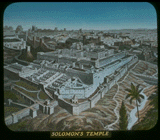
We
have already noticed that the Tabernacle represented God's
temporary residence with the Israelites. Later on, the
Temple was substituted for the Tabernacle. Thus God indicated
that He would later abide permanently with His people.
King
David, as we have seen, represented Christ during this
Gospel Age. He collected the materials for the Temple,
but was not permitted to build. The lesson is that the
Divine arrangement complete is not to be established by
Christ in the flesh, but by the Christ of glory, represented
by Solomon.
The
Temple of Solomon was destroyed in B.C. 606, but later
on King Herod, who was not a Jew, but a descendant of
Esau, favored the Jews by building a great Temple which
was in its grandeur in Jesus' day.
Those
Temples were merely typical of the greater Temple which
St. Paul and St. Peter declared to be the Church. "The
Temple of God is holy, which Temple ye are;" and
again: "Ye are built up a Holy Temple, a habitation
of God through the Spirit." St. Peter declares all
of God's faithful saints to be Royal Priests, living stones
in the Temple of God, through which, eventually, all the
world shall have access to God.
The
stones of Solomon's Temple were shaped at the quarry before
being brought to the Temple site. Likewise its beams were
prepared in advance. The workmen put together the Temple
"without sound of hammer." Every piece was so
thoroughly fitted that no force was necessary.
This
typified the building of the antitypical Temple, the preparation
of the Church in the present life and their construction
by and by as God's Spiritual Temple, by resurrection power.
This is the meaning of the trials, chiselings and polishings
which all true Christians must receive. The resurrection
change will bring all these living stones together without
force or compulsion. Then the glory of the Lord will fill
the true Temple and the New Dispensation will begin.
Elijah
and the Priests of Baal
Ahab,
King of Israel, misled by his queen, Jezebel, perverted
the religion in God's typical Kingdom. The ordained worship
in the Temple was neglected and image worship established.
The faithful Prophet Elijah reproved King Ahab, and was
compelled by the wicked Queen Jezebel to flee into the
wilderness, where ravens fed him for three and one-half
years.--1 Kings 17:5,6.
Finally,
by God's direction, Elijah reappeared and challenged the
priests of Baal to a public test as to which god could
answer prayer, Jehovah or Baal. Whichever god would accept
the offering by fire from heaven to consume the sacrifice,
should be acknowledged as the true God. The Israelites
saw the fairness of the proposition, and Baal's priests
could not avoid the issue. Elijah gave them the preference.
All day long they agonized, cut themselves with stones
and cried to Baal to accept the offering and vindicate
his cause. Elijah mocked them, saying, Cry a little louder!
Baal may be sleeping! or perhaps he has gone on a journey!
When
the evening came, Elijah gave his test. First of all he
had water carried and poured over all the altar and the
sacrifice, that there should be no mistake; lest any one
might think of any concealed fire. Then Elijah prayed
to God to vindicate His cause. Fire descended from heaven
and consumed the sacrifice, licking up even the water
in the trench. When the people saw this they gave a great
shout and declared, "Jehovah, He is God!"--1
Kings 18:30-39.
Bible
students claim that Elijah represented the True Church,
Queen Jezebel a false religious system, Ahab the governments
of Earth. The time of Jezebel's persecution, when Elijah
hid in the wilderness and there was no rain for 1260 days,
represented 1260 years of spiritual drouth (538 A.D. to
1798 A.D.), when the antitypical Jezebel's power to persecute
to death ceased.--Revelation 12:6,14;13:5.
Elisha,
Elijah's successor, restored the Shunammite's son.
King
Zedekiah Blinded
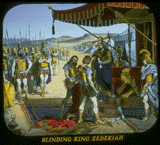
God
promised King David that the Messianic Kingdom should
come through his line, and for several centuries no king
reigned in Jerusalem except David's posterity. The last
was King Zedekiah. Of him God declared through the Prophet
(Ezekiel 21:25-27), "O thou profane and wicked prince,
whose time is come that iniquity should have an end! Take
off the diadem, remove the crown; this shall not be the
same. I will overturn, overturn, overturn it, until He
come whose right it is, and I will give it to Him."
This was another way of saying that there would be no
more kings of David's line until Messiah. This has been
fulfilled during the long period of 2519 years from then
until now. All later kings were tributary, and none of
David's line.
When
God took His Kingdom from Zedekiah, He told him through
one of the Prophets that he would be carried prisoner
by Nebuchadnezzar to Babylon; and by another Prophet that
he would never see Babylon. Both prophecies came true,
for Nebuchadnezzar caused his eyes to be put out when
a prisoner, and in that condition he went to Babylon.
But
God's promise to David, "Of the fruit of thy loins
shall a king sit upon thy throne forever," was not
broken. The message to Zedekiah merely indicates that
the throne ceased to be recognized of the Lord, and would
thus remain until Messiah's Kingdom.
But
the First Advent of Jesus did not fulfil this prophecy;
for, although Jesus is the Messiah, He has not yet entered
upon His Kingly office. Jesus began His service as a Priest--
"He offered up Himself." His offering continues
these nineteen hundred years. Since Pentecost He has been
accepting and offering as His members such as present
their bodies living sacrifices. (Romans 12:1.) These joint-sacrificers
are promised, as "members of the Body of Christ,"
a share in the Messianic reign of a thousand years, for
the blessing of Israel and the whole world.--Revelation
20:6.
Jerusalem
Desolated
Seventy Years
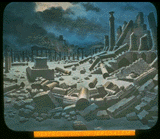
Nebuchadnezzar,
after blinding King Zedekiah, deported him and the people
to Babylonia, and utterly destroyed Jerusalem and its
Temple with fire. The Bible says that the city lay desolate
for seventy years.
Those
seventy years of desolation of Jerusalem are Scripturally
declared to have been a punishment upon the Israelites
for not properly keeping their Jubilee years, which God
had appointed them. Every fiftieth year was to be a Jubilee
year, when all debts expired and all property was to be
returned to its original owner--typifying the coming "Times
of Restitution." (Acts 3:19-21.) But the Israelites,
like all other peoples, were selfish. They knew that this
observance would mean loss. Hence they kept these Jubilee
Sabbaths very imperfectly for awhile, and gradually discontinued
them.
God
explains that the seventy years' desolation following
the taking of the Israelites into captivity was a substitute
for the whole number of Jubilee years. This we read was,
"to fulfil the word of the Lord by the mouth of Jeremiah,
until the land had enjoyed her Sabbaths; for so long as
she lay desolate she kept Sabbath, to fulfil threescore
and ten years."-- 2 Chronicles 36:21; Jeremiah 25:11.
Bible
students reason that if the entire number of Jubilees
was to be seventy, and if the Jubilee cycles were forty-nine
years each, then seventy cycles from the time the Jubilees
were instituted would mark the beginning of the Antitypical
Jubilee--the "Times of Restitution." This they
reckon somewhere about the year A.D. 1874. Many hold that
we are living in the time when the Antitypical Jubilee
is being inaugurated; mankind will return gradually to
all their rights and privileges for a thousand years.
The present social unrest is incidental to the great change.
We are living in the beginning of the New Era. Growing
intelligence is bringing emancipation, and shortly the
Messianic Kingdom will multiply the blessings and wipe
out the curse.--Revelation 21:4,5.
Nebuchadnezzar's
Dream Interpreted
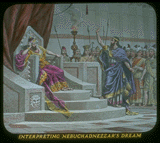
Daniel,
a young Israelite taken captive to Babylon with others,
later became God's Prophet. King Nebuchadnezzar had an
impressive dream which on waking he could not recall.
His "wise men" could not help him. Finally Daniel,
guided by the Lord, told both the dream and its interpretation.--Daniel
2:1,5,26-30.
The
dream and its interpretation interests and concerns us
today as much or more than it did Nebuchadnezzar. In his
dream the King saw a great Image; its head was gold, its
breast and arms silver, its belly and sides brass, its
legs iron, and its feet iron intermingled and smeared
with clay. Then the King saw a Stone cut out of the mountain
without hands and hurled at the feet of the Image. The
Image fell, ground to powder, and the wind carried it
away. Then the Stone grew until it filled the earth.--Daniel
2:31-35.
The
Divine interpretation of this dream, given through Daniel,
explains that the head of the Image was the Babylonian
Kingdom, the breast and arms the succeeding Medo- Persian
Empire, the belly and sides of brass the Grecian Empire,
which followed, and the legs the succeeding Roman Empire.
The feet represented the "Holy Roman Empire"
and its successors; the iron of the feet the civil power,
the clay intermingled and smearing over the iron pictured
the ecclesiastical power of our day. Thus seen, we are
living in the days of the ten toes, or divisions of the
Image.
The
Stone represents God's Kingdom, which the clay on the
feet of the Image imitated. The Stone represents God's
Elect Church, gathered out from Jews and Gentiles, and
from every nation and denomination, to constitute Messiah's
Kingdom. Shortly, this Kingdom will be established in
power and great glory, and the kingdoms of this world
will disappear as by magic. Messiah's Kingdom will then
grow until it fills the whole earth, and brings all things
under its control, every wilful sinner being cut off in
the Second Death.
Daniel's
Dream-Another View
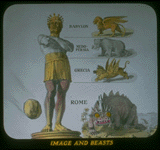
Between
Zedekiah and Messiah, there has been a long period of
time. During this period God gave a lease of government
to the Gentile Kingdoms, represented in Nebuchadnezzar's
Image. That lease of power to rule the world as best they
could was to last for "seven times"--seven symbolic
years, each day of which (lunar time) would represent
a year. Thus "seven times" would mean seven
times three hundred and sixty, that is, 2520 years. That
period expired in 1915. In other words, the
Gentile lease of Earthly Dominion has expired. Then the
due time will come for Messiah's Kingdom to begin its
reign. This seems to explain present social unrest.
The
same facts presented to King Nebuchadnezzar, God showed
under different symbols to the Prophet Daniel. Instead
of a great Image, Daniel saw great Beasts. This means
that the Gentile governments, so grand to worldly men,
appear beastly from the Divine viewpoint. Surely we can
agree to this as we look over the bloody pages of history;
the world has been under beastly rule, even though the
best it was able to provide for itself--and though much
worse conditions could be imagined--for instance, Anarchy.
The
first beast of Daniel's dream, a lion, represented Babylon;
the second, a bear, Medo-Persia; the third, a leopard,
Grecia-- the four heads representing Alexander the Great's
successors, four generals. The fourth beast represented
the Roman Empire. Its ten horns corresponded to the ten
toes of the Image. The horn that had eyes and was crowned,
is believed by many to represent ecclesiastical power
enthroned amid political power.
A
judgment scene was shown to Daniel, in which all these
governments were disapproved, and the dominion taken from
them and given to One who appeared like unto The Son of
Man. The Kingdom given Him was a perpetual one, that all
should serve and obey Him; and all beastly governments
were destroyed.--Daniel 7:13-27.
|
